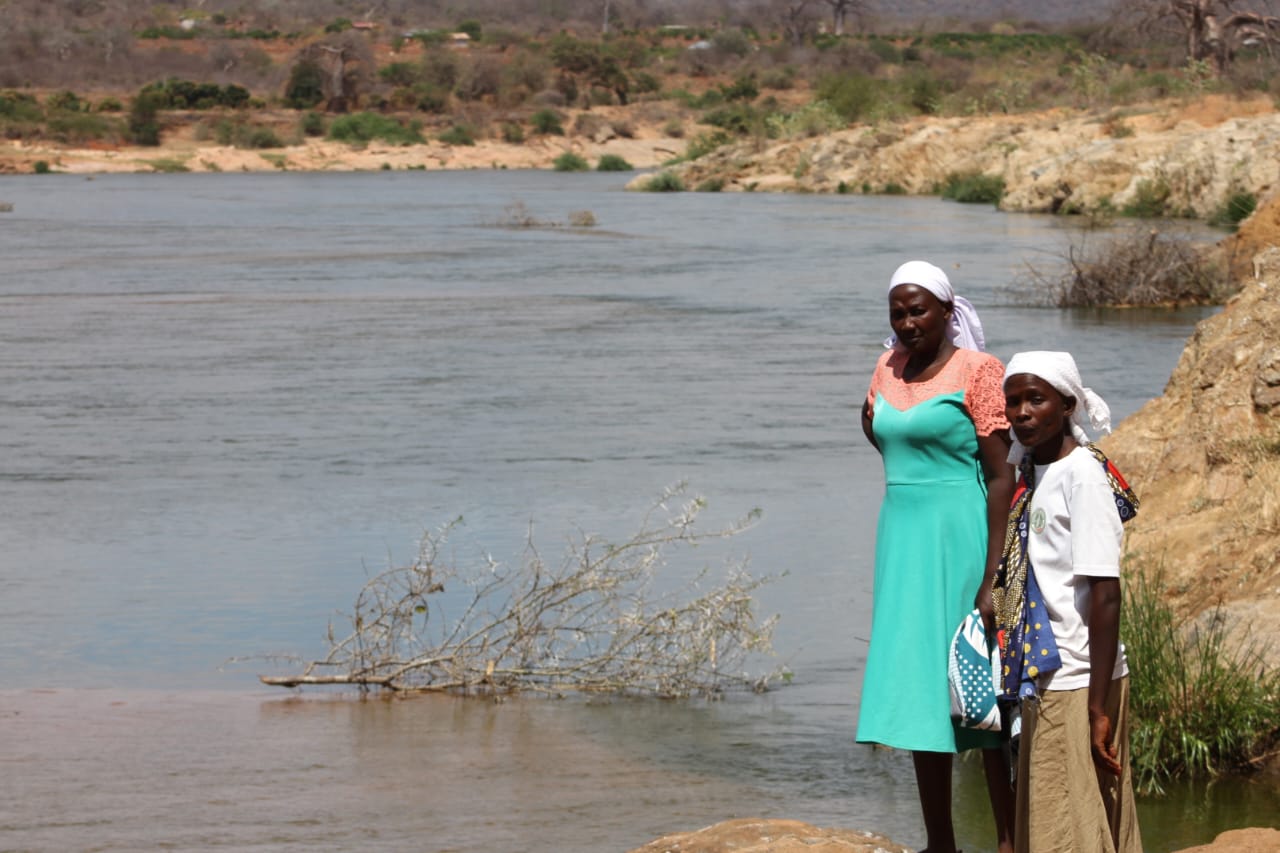 Mbatha Ndambuki, mother of 13-year-old Kenius Mutuku, and her friend Jacinta Ndunge keep vigil along River Athi as the search for Mutuku’s body continues following a crocodile attack on Friday, August 22, 2025. Photo: Andrew Mbuva.
Mbatha Ndambuki, mother of 13-year-old Kenius Mutuku, and her friend Jacinta Ndunge keep vigil along River Athi as the search for Mutuku’s body continues following a crocodile attack on Friday, August 22, 2025. Photo: Andrew Mbuva.
By Andrew Mbuva - Editor
For the people of Makaani Village in Makueni County, water – the most basic of life’s needs – has become a daily gamble with death. The sprawling River Athi, their only source of water for drinking, cooking, and livestock, is now a river of fear, heavily infested with crocodiles that have turned life into a nightmare.
Last Friday, tragedy struck once again when 13-year-old Kenius Mutuku was mauled by a crocodile as he went to fetch water. A week later, his grieving mother, Mbatha Ndambuki, is still camped by the riverbank, her eyes tired from days of searching for her son’s remains.
“We have been here since Friday when the incident happened. Up to now, we have not been able to locate the body of my child,” she says, her voice breaking. “The Kenya Wildlife Service (KWS) officers have tried. They’ve set several traps, but the rogue crocodile is yet to be caught. All we want is total assistance, because this has been very heavy for us.”
The pain of Mutuku’s family is not isolated. In Makaani and neighboring villages, crocodile attacks have become an all-too-familiar tragedy. Residents recount grisly stories of neighbors maimed, livestock dragged under, and some victims vanishing completely without a trace.
“As residents, we depend on this river for water, but it comes with a great risk,” explains neighbor Jacinta Ndunge. “These crocodiles don’t just attack people – they attack our goats, cows, donkeys. Just the other day, another neighbor lost his leg after a crocodile bite. Others have disappeared completely. We now want KWS to remove these crocodiles because they’ve become a menace. We also want the County Government to pump water to higher, safer places where we can fetch without going into the river.”
The growing crisis has forced local administrators into desperate measures. Kikumbulyu Chief, Nicholas Mutie, admits the situation is dire, but insists residents must remain vigilant.
“We have for years experienced this human-wildlife conflict in this region, mostly during the dry season when people rely on the river for water. My plea to locals is to exercise caution whenever they go to fetch water or take cattle to the river,” he says.
In what appears to be the government’s most drastic intervention so far, Mutie has banned all fishing activities in the river until further notice.
“We have stopped any fishing activity in the river for now,” he warns. “Anyone secretly fishing or selling fish will be arrested to explain where they got the authority. This is for their own safety because we cannot afford to keep losing lives.”
But for many residents, the ban feels like a band-aid solution on a festering wound. It may keep a few fishermen safe, but it does nothing to solve the central dilemma: how to access water without falling prey to crocodiles.
The Athi River cuts across several villages, providing life and death in equal measure. As climate change worsens drought and alternative water projects remain stalled, villagers continue to stand at the dangerous crossroads of thirst and survival.
For now, families like that of young Kenius Mutuku can only hope that the government moves beyond bans and warnings – and provides a lasting solution before more lives are lost to the crocodile-infested waters.